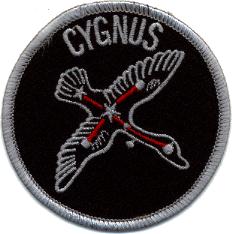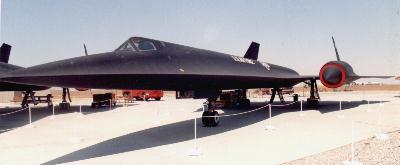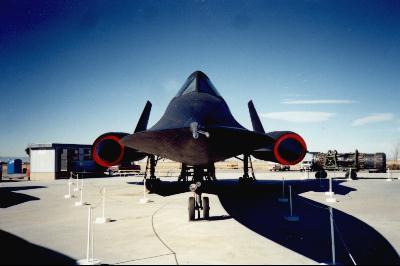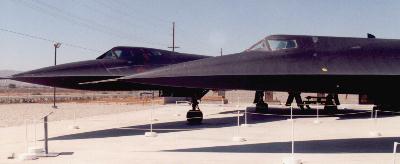 |
Most people, when shown a picture of an A-12 would say, "Oh that? That's an SR-71", if there was any recognition at all on their part. But they would be wrong. It takes a hardcore aircraft wonk to note the differences between the two craft at any distance, but the differences are significant.
The A-12 was born in absolute secrecy at the end of the 1950s. It was a response to those pesky Soviets shooting at our U-2 planes. You can't hit what you can't catch, the theory went. Our friends at the CIA, given the proper smoozing by Lockheed ("If you have some money, we've thought of a neat way to spend it..."), decided to get into the aircraft business and eventually had 15 A-12s built.
Officially, the program was known as Oxcart, a misnomer if ever there was one. Since no self-respecting pilot wanted to fly something as un-sexy as an "Oxcart", Lockheed unofficially dubbed them "Cygnus", named after the constellation of Cygnus the swan.
 |
But where to hide these radical looking aircraft? How about that run down old U-2 facility out at Groom Lake? Brush away all the fallout and it would be just fine. So started a massive expansion of the base, which brought it to what it generally looks like today.
The first A-12 lifted off from Groom on April 26, 1962, 35 years ago. This is absolutely amazing technology for 35 years ago. And notwithstanding the Aurora rumors, it's still the fastest plane in the skies today. Actually, it's not in the skies anymore, only a few SR-71s remain. Of the 15 A-12s that were built, 9 remain, scattered in museums across the country.
Now an SR-71 is nothing to sneeze at. It's pretty damn fast in its own right, and it seats two instead of the A-12's single, overworked occupant. But it just doesn't have the same charisma as its sneaky black older brother. The SR-71 was publicly announced in late 1964, prior to its first flight. The A-12s had already been zipping around for two years! And although much remained classified about the SR-71, it was still very much in the public eye.
The A-12 program was just the opposite, hiding out at Groom Lake (with occasional overseas postings) until the program was finally closed down in June of 1968. The burdens of running both the A-12 and SR-71 programs were just proving too costly. Besides, the Air Force wasn't too pleased that the CIA was in the spy plane business and wanted to keep all that sexy Mach 3 stuff to themselves. But even though the project was shut down in 1968, the surviving A-12s were put in secret storage, and the project remained classified until 1981!
 |
 |
The following is a comparison gleaned from the exhibit placards for both the A-12 and SR-71A on static display at the Blackbird Airpark in Palmdale, California. There's been continual discussion among many aircraft fans as to just how fast or how high these things could go. If "official" inquiries are made, the answer is often "That information is still classified". Yet I'd suspect this data, quietly displayed on a street corner in Palmdale, is pretty close to the truth. After all, who's going to argue with Lockheed? Even so, certain atmospheric conditions could allow either of these craft to exceed their listed parameters slightly.
| A-12 | SR-71A | |
|---|---|---|
| Maximum Speed | Mach 3.35 at 85,000' (Estimated) | Mach 3.2 at 85,000' (Estimated) |
| Maximum Operational Ceiling | 95,000' | 85,000' |
| Maximum Unrefueled Range | 2,500 miles | 3,250 miles |
| Wing Span | 55.6 ft. | 55.6 ft. |
| Wing Area | 1,795 sq. ft. | 1,795 sq. ft. |
| Length | 98.75 ft. | 103.8 ft. |
| Empty Weight | 60,000 lbs. | 67,500lbs. |
| Gross Takeoff Weight | 120,000 lbs. | 152,000 lbs. |
| Sensor Payload | 2,500 lbs. | 3,500 lbs. |
The numbers show that the A-12 was a little faster and could climb a little higher than the SR-71. It was, after all, a significantly lighter aircraft. Of course, the A-12 couldn't carry as much fuel, and its sensor payload was less, but an A-12 pilot was spared the annoyance of a yappy passenger in the rear seat. It was just him and his plane. Oh yeah, and all that neat spy equipment he had to operate, while at the same time flying 3 times the speed of sound. Maybe a yappy passenger wasn't such a bad idea after all. Overall, the two craft are more alike than they are different.
 |
So, a summary of why A-12s are so cool:
So wouldn't it be fun to find parts of one.....